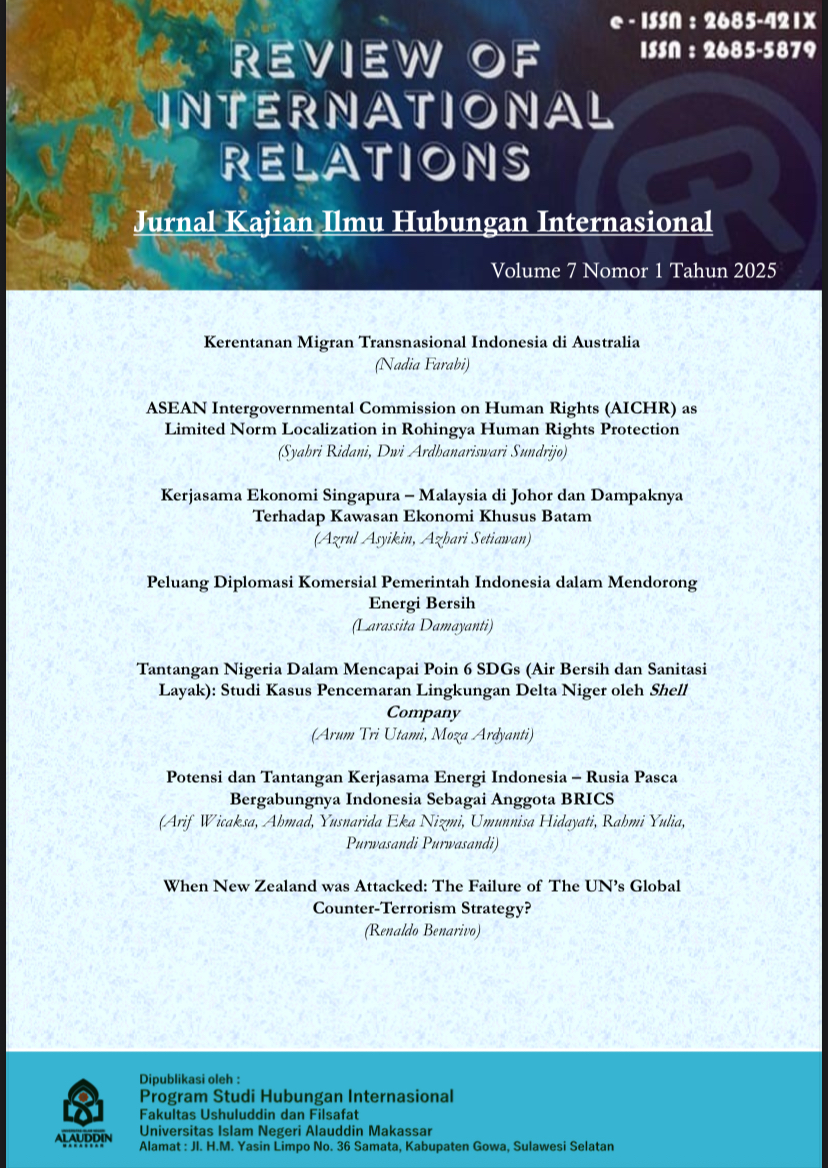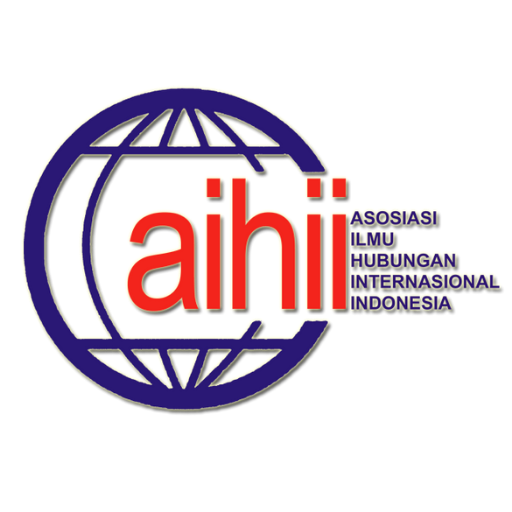When New Zealend was Attacked: The Failure of The UN'S Global Counter-Terrorism Strategy?
DOI:
https://doi.org/10.24252/rir.v7i1.57617Keywords:
Christchurch tragedy, United Nations, counter-terrorism, national securityAbstract
The spectrum of security threats continues to grow. This occurs due to broadening the meaning of security from traditional to non-traditional. The consequence of this phenomenon is that no country is truly safe because threats come that are difficult to predict. For example, the threat of terrorism, an attack that is not always institutionalized and often takes the form of individual actions, makes it challenging to overcome without a unique strategy. As a country that is known to be safe, New Zealand is not immune from the threat of terrorism. Even though the UN already has a Global Counter-Terrorism Strategy, it has little impact, especially when talking about the Christchurch tragedy, which has attracted world attention. From a national security perspective, the research describes how the United Nations Global Counter-Terrorism Strategy (UNGCTS) should be operationalized and why countries like New Zealand could miss out. Using a qualitative approach as a research method, at the end of this research, it was concluded that many factors must be considered when discussing countering terrorism, not just relying on general norms or rules and forgetting about micro-managing efforts.
Downloads
References
Amaritasari, Indah. (2015). Keamanan Nasional dalam Konsep dan Standar Internasional. Jurnal Keamanan Nasional, 1(2), 153-173. https://doi.org/10.31599/jkn.v1i2.21
Bakry, U. S. (2016). Metode Penelitian Hubungan Internasional. Pustaka Pelajar.
Barlian, E. (2016). Metodologi Penelitan Kualitatif dan Kuantitatif. Sukabina.
Battersby, J. (2017). Terrorism Where Terror Is Not: Australian and New Zealand Terrorism Compared. Studies in Conflict & Terrorism, 41(1), 59–76. https://doi.org/10.1080/1057610X.2017.1287501
Carroll, P. & Windle, J. (2018). Cyber as an Enabler of Terrorism Financing, Now and in The Future. Journal of Policing, Intelligence and Counter Terrorism, 13(3), 285-300. https://doi.org/10.1080/18335330.2018.1506149
Damhuri, P. (2021, January 9). FPI dalam Pusaran Konflik China vs Barat https://news.republika.co.id/berita//qmnifg440/news-story-fpi-dalam-pusaran-konflik-china-vs-barat? Accessed on March 23, 2025.
Goldman, O. (2010). The Globalization of Terror Attacks. Terrorism and Political Violence, 23(1), 31-59. https://doi.org/10.1080/09546553.2010.514776
Ikbar, Y. (2014). Metodologi dan Teori Hubungan Internasional. Refika Aditama.
Kusuma, A., Warsito, T., Surwandono, S., & Muhammad, A. (2019). Indonesia dan Ancaman Terorisme: Dalam Analisis Dimensi Imaterial. Sosiohumaniora, 21(3), 333-341. https://doi.org/10.24198/sosiohumaniora.v21i3.21142
Ningrum, D. P. 2020. Islamophobia in New Zealand Case Study of Terrorism Threat to Immigrants in New Zealand 2019. Universitas Komputer Indonesia.
Raco, J. R. (2010). Metode Penelitian Kualitatif: Jenis, Karakteristik dan Keunggulannya. Gramedia Widiasarana Indonesia.
Rakhmawati, N. (2010). Interfaith Dialogue in Indonesia's Public Diplomacy. Global: Jurnal Politik Internasional: 10(1), 58-74. https://doi.org/10.7454/global.v10i1.274
Saadat, S. Y. (2020). International Cooperation for Counter-terrorism: a Strategic Perspective. Journal of Policing, Intelligence and Counter Terrorism, 15(1), 83–93. https://doi.org/10.1080/18335330.2020.1732451
Santosa, B. A. 2017. The Role of Mass Media in Conflict Prevention. Universitas Sebelas Maret.
Simanjuntak, C. 2007. Dampak Tragedi 11 September 2001 Terhadap Kebijakan Pertahanan Keamanan di Indonesia dalam Upaya Mengatasi Terorisme. Universitas Sumatera Utara.
Subagyo, A. (2015). Teroris(me) : Aktor & Isu Global Abad XXI. Alfabeta.
United Nations General Assembly. (2005). 2005 World Summit Outcome (A/RES/60/1). United Nations. https://undocs.org/A/RES/60/1
Vermonte, P. J. (2003). Menyoal Globalisasi dan Terorisme. In Hardiman, F. B., Marpaung, R., & Araf, A. (Eds.), Terorisme: Definisi, Aksi dan Regulasi. Imparsial.
Wibisono, A. A., & Kusumasomantri, A. R. (2020). Assessing the Expectations and Limitations of ASEAN-EU Counter-Terrorism Cooperation. JAS (Journal of ASEAN Studies), 8(1), 61-80. https://doi.org/10.21512/jas.v8i1.6171
Zhao, J., Wang, X., & Zhan, J. (2024). Is international Cooperation Effective in Combating Terrorism? Evidence From the Shanghai Cooperation Organization. Applied Economics, 56(47), 5575–5590. https://doi.org/10.1080/00036846.2024.2331030
Downloads
Published
How to Cite
Issue
Section
License
Copyright (c) 2025 Renaldo Benarrivo

This work is licensed under a Creative Commons Attribution-ShareAlike 4.0 International License.




